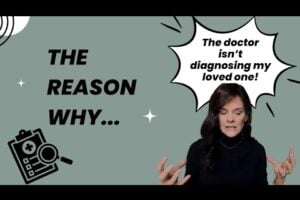While memory loss is an early symptom of Alzheimer’s disease, its presence doesn’t mean a person will develop dementia. A new study at the Centre for Addiction and Mental Health (CAMH) has found a clinically useful way to predict who won’t develop Alzheimer’s disease, based on patients’ awareness of their memory problems.
Unaware of Memory Loss
People who were unaware of their memory loss, a condition called anosognosia, were more likely to progress to Alzheimer’s disease, according to the study, published today in the Journal of Clinical Psychiatry. Those who were aware of memory problems were unlikely to develop dementia.
Memory Worries Drive Anxiety, Causing Forgetfulness
There is a great irony in people who worry a lot about getting Alzheimer’s. Anxiety causes memory loss. So if you get anxious whenever you forget something, and start worrying about getting Alzheimer’s, your heightened anxiety is going to make your memory worse. Then, you worry more and up the anxiety level. Next, you forget even more. And so on.
“If patients complain of memory problems, but their partner or caregiver isn’t overly concerned, it’s likely that the memory loss is due to other factors, possibly depression or anxiety,” says lead author Dr. Philip Gerretsen, Clinician Scientist in CAMH’s Geriatric Division and Campbell Family Mental Health Research Institute. “They can be reassured that they are unlikely to develop dementia, and the other causes of memory loss should be addressed.”
Unawareness Ups Caregiver Burden
In other cases, the partner or caregiver is more likely to be distressed while patients don’t feel they have any memory problems. In Alzheimer’s, lack of awareness is linked to more burden on caregivers. Both unawareness of illness (anosognosia) and memory loss (known as mild cognitive impairment) can be objectively assessed using questionnaires.
The study, believed to be the largest of its kind on illness awareness, had data on 1,062 people aged 55 to 90 from the Alzheimer’s Disease Neuroimaging Initiative (ADNI). This included 191 people with Alzheimer’s disease, 499 with mild cognitive impairment and 372 as part of the healthy comparison group.
Getting Brains Enough Glucose
The researchers also wanted to identify which parts of the brain were affected in impaired illness awareness. They examined the brain’s uptake of glucose, a type of sugar. Brain cells need glucose to function, but glucose uptake is impaired in Alzheimer’s disease.
Using PET brain scans, they showed that those with impaired illness awareness also had reduced glucose uptake in specific brain regions, even when accounting for other factors linked to reduced glucose uptake, such as age and degree of memory loss.
As the next stage of this research, Dr. Gerretsen will be tracking older adults with mild cognitive impairment who are receiving an intervention to prevent Alzheimer’s dementia. This ongoing study, the PACt-MD study, combines brain training exercises and brain stimulation, using a mild electrical current to stimulate brain cells and improve learning and memory. While the main study is focused on dementia prevention, Dr. Gerretsen will be looking at whether the intervention improves illness awareness in conjunction with preventing progression to dementia.
SOURCE:
- The Centre for Addiction and Mental Health (CAMH) is Canada’s largest mental health and addiction teaching hospital, as well as one of the world’s leading research centres in its field. CAMH combines clinical care, research, education, policy development and health promotion to help transform the lives of people affected by mental health and addiction issues. CAMH is fully affiliated with the University of Toronto, and is a Pan American Health Organization/World Health Organization Collaborating Centre.
REFERENCE:
- Philip Gerretsen, Jun Ku Chung, Parita Shah, Eric Plitman, Yusuke Iwata, Fernando Caravaggio, Shinichiro Nakajima, Bruce G. Pollock, Ariel Graff-Guerrero. Anosognosia Is an Independent Predictor of Conversion From Mild Cognitive Impairment to Alzheimer’s Disease and Is Associated With Reduced Brain Metabolism. The Journal of Clinical Psychiatry, 2017; DOI: 10.4088/JCP.16m11367












This article on Alzheimer’s is truly eye-opening and informative. As someone who has been noticing some memory issues in myself or my loved ones, this topic hits close to home. Reading about the early signs and risk factors of Alzheimer’s has made me realize the importance of being proactive about our brain health.
When it comes to concerns about cognitive health, it’s crucial not to go through it alone and the need to talk to someone whether it’s a friend, family member, or a healthcare professional, can provide much-needed support and guidance during these uncertain times. I appreciate that this article emphasizes the significance of seeking help and advice when dealing with possible Alzheimer’s symptoms. It’s reassuring to know that there are resources available and people willing to listen and assist us on this journey.